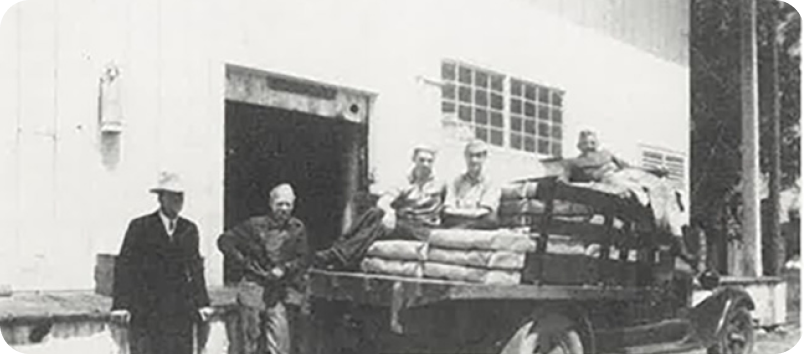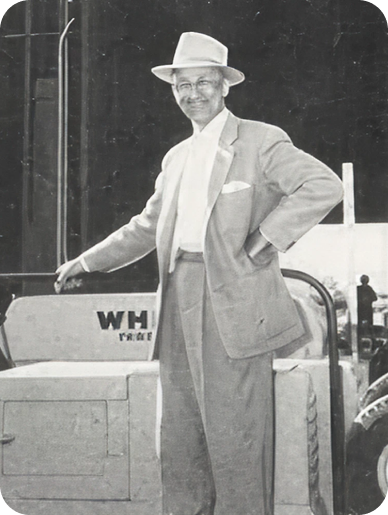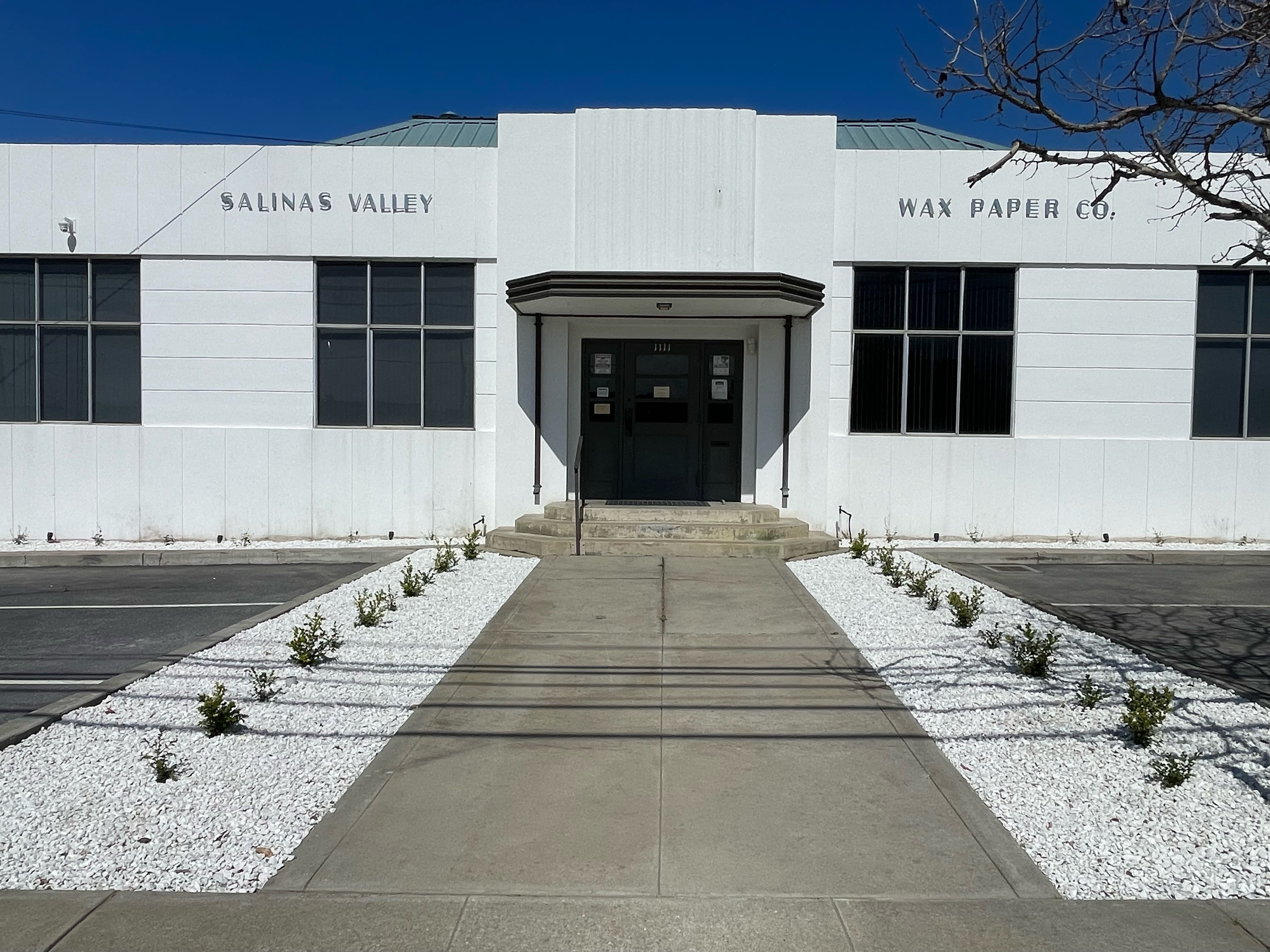Salinas Valley Wax Paper
Goetz was an idea man

Neither of the two founders of the Salinas Valley Wax Paper Company had much knowledge of the paper business when they first set out to establish a bread wrap operation in the mid-1920s. But the firm they created has survived a corporate evolution that spans three generations.
The company founders, Charles E. Goetz and T.G. Emmons, met while working in the Arizona mining industry. Although they shared an interest in the mining business, they were two very different men.
But Goetz' store was losing money and he wanted to get into another line of business. He had the idea of starting a wax paper company to produce the new paper bread wrappers that were becoming popular.
Goetz was an idea man, a promoter. He knew he could not hold up to the technical end of such an operation and needed a partner who could make his ideas work.
So Goetz took his idea to Guy Emmons, who had studied mining engineering at the University of Arizona at Tucson and had come to Benson to pursue a career in that industry. But mining had begun its decline, and Emmons was about to open an auto repair garage when Goetz convinced him to invest $500 and join in the wax paper enterprise.
Goetz and Emmons set up their first wax paper operation in Benson in 1926. Their biggest customer turned out to be a local dynamite manufacturer, the Apache Powder Company, which used the paper to line its powder cases. The bread wrap idea had failed because of production and marketing problems. If the firm was going to survive it was going to need more customers. So Goetz traveled to Yuma to sell waxed crate liners to the lettuce shippers there.
Goetz and Emmons set up their first wax paper operation in Benson in 1926. Their biggest customer turned out to be a local dynamite manufacturer, the Apache Powder Company, which used the paper to line its powder cases. The bread wrap idea had failed because of production and marketing problems. If the firm was going to survive it was going to need more customers. So Goetz traveled to Yuma to sell waxed crate liners to the lettuce shippers there.
That was when he met Bruce Church. Goetz was having lunch in a Yuma hotel restaurant one day during his trip when a bellboy paged Church. Goetz asked his luncheon companions who Church was, and they told him he was an important lettuce shipper from Salinas, California.
As soon as Church hung up the phone, he found himself facing the engaging Goetz. The two men talked at length about the lettuce business in the Salinas Valley. When Church complained that he was paying too much for crate liners and suggested that the area could use a manufacturer, Goetz knew he had found the market he was looking for. He promptly sent a telegram to Benson and caught the first train to California.
The enterprise's first Salinas operation opened in 1928 in a portion of a Spreckels Sugar Company warehouse. Emmons moved to Salinas at that time to run the new operation, while Goetz returned to Benson. Emmons operated the plant in Spreckels for nine years and, despite the onset of the Great Depression, the company grew so much that in 1937 the operation was moved to a new, 13,000-square-foot facility on Highway 101, now Abbott Street, just outside Salinas.
For the next 17 years the firm continued to grow, becoming an important supplier of waxed paper products for the produce industry. The Benson plant was eventually closed, and Goetz started an ice company and packing shed operation near Phoenix. Management of the wax paper operation was left to Emmons.
At the start of World War II, all but three of the company's employees joined the armed forces. During that time Emmons, his foreman, and Emmons' young son-in-law, Gaylord H. Nelson, worked long hours with limited qualified help, six days per week, producing waterproof laminated kraft paper for the war effort.
In the early 1950s vacuum cooling technology revolutionized Salinas Valley fresh produce shipping operations. With the new process, corrugated cartons were used, and lettuce packers needed very little ice to ship their produce, and they did not require wooden crates or wax paper liners.
Ironically, the man who first encouraged Goetz and Emmons to bring their business to Salinas was the one who nearly closed it down. Bruce Church was the principal figure in founding Growers Container Corporation, which manufactured the new fresh produce corrugated containers. Emmons and Goetz could not compete in that field.
Salinas Valley Wax Paper did cope, however, with this nearly devastating change by diversifying its product line. Limited production of certain liner papers for row crops that were still crated, such as celery and green onions, continued as before. But the line of laminated asphalt paper was increased to include laminated foil, flashing paper, and other special grades for the building industry. The company survived and even prospered with added waxed and other lines.
Ironically, the man who first encouraged Goetz and Emmons to bring their business to Salinas was the one who nearly closed it down. Bruce Church was the principal figure in founding Growers Container Corporation, which manufactured the new fresh produce corrugated containers. Emmons and Goetz could not compete in that field.
Salinas Valley Wax Paper did cope, however, with this nearly devastating change by diversifying its product line. Limited production of certain liner papers for row crops that were still crated, such as celery and green onions, continued as before. But the line of laminated asphalt paper was increased to include laminated foil, flashing paper, and other special grades for the building industry. The company survived and even prospered with added waxed and other lines.

In 1956 Emmons retired from active management of the Salinas Valley Wax Paper Company, and Gay Nelson became a limited partner. Emmons died two years later in Sedona, Arizona, and Mrs. Emmons sold her interest in the operation to the Nelson family.
Charlie Goetz sold his interest in the company to the Nelsons in 1969, but continued to actively pursue a variety of enterprises until his death at age 93.
In 1970 Charles Emmons Nelson joined the firm as general manager, making the Salinas Valley Wax Paper Company a third-generation family operation.
Gay and Charles Nelson have continued to diversify their firm's product line and successfully adapt to an ever-changing marketplace. In 1974 they added a four-color printing press to broaden their production capabilities. They later introduced waxed and shredded florist tissues, printed tissue, wine bottle wraps, oiled meat wraps, and a broad range of specialty paper items. Recent additions to sheet cutters, laminating, and roll-rewinding equipment have expanded size of product line and maximized versatility, service, and quality.
By focusing on innovation, hard work, and integrity at all levels of operation, the Salinas Valley Wax Paper Company has weathered a storm of change with its competent administrative and production force, and will keep going strong for another 60 years.

